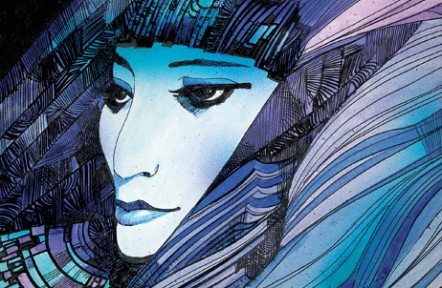Italian comics master Sergio Toppi passed away in August. In December, Archaia released his first work in English, Sharaz-De, a retelling of the Thousand and One Arabian nights. It may seem odd that for a book of overwhelming visual appeal I’m going to do a largely imageless post, but the blog coverage has been so thorough that it’s a job best left to them. So please click through to be dazzled!
First, a preface from Illustrators’ Lounge apropos his passing:
Milanese illustrator Sergio Toppi began his career in advertising but by 1966 had moved into comics. Toppi accumulated a tremendous body of work during his career include titles such as Collezionista (“Collectorâ€), Linus, Corto Maltese and many one-shot comics during his long-term collaboration with writer Il Giornalino. His style is unmistakeable, geometrically dominated with loose sketchy pencil work. A fantastic amalgamation of tone, patterns and texture.
At Comics Bulletin Jason Sacks has only the highest praise:
The word “visionary” is sometimes thrown around too liberally in the arts. I often find myself using the term to describe a creator whose work is just a bit different from the mainstream, innovative in small but interesting ways that move their medium ahead, or to the side, or at a distinct angle, but still within comfortable confines. It takes a certain kind of artist to reveal to me what it means to be a true visionary in the comics field.
Sergio Toppi is a true visionary, and his Sharaz-De: Tales from the Arabian Nights is a true visionary work. In all my years reading comics I’ve never read something quite as unique, odd and intriguing as this book.
The encomium continues in detail with Greg Burgas of Comic Book Resources:
It’s Toppi’s magnificent artwork, however, that makes this a must-buy. Walt Simonson wrote the foreword to this book, and it’s not surprising that Simonson writes about how much he loves Toppi’s work – Toppi is obviously a big influence in Simonson’s art. I don’t even know if I can write about his artwork well enough to do it justice. Toppi is amazingly detailed, as the desert world in which the book is set comes to magnificent life under his pen, and his use of swirling lines make it even more Asiatic and lustrous. This is an “Orientalist,†archaic view of the Arab world, but it’s still marvelous. Toppi’s characters are bold and striking, with a mixture of Semitic and African characteristics, and Toppi adorns them in gorgeous robes and armor and headgear that turn them into gods on earth, easily able to contend with the demons and djinn who also populate the book. He uses negative space beautifully, and his page compositions are superb – he uses panels, but he also often blends several scenes together in one splash page that remain remarkably easy to read. His creatures are beautiful – enormous and occasionally grotesque, but also marvelously ornate and perfectly suited for the magical world that Sharaz-De embroiders every night. Toppi experiments with some colors in the book, and those are wonderful, too – deep blues and purples and greens turn the desert at night into a mystical place, while the rich browns and yellows of the clothing during the day make the characters almost a part of the landscape. It’s an amazingly sensual book, packed with precise details and expansive vistas and fierce characters, and perhaps the only one who comes close in American comics is Simonson himself.
Publishers Weekly echoes these sentiments:
Two chapters are given over to vibrant watercolors, adding a psychedelic undertone to the tightly woven ink work elsewhere, as jinn, devils, and selfish men do battle upon the pages. Toppi does not use conventional comic panels, but allows his illustrations to sprawl behind and around them, with a singular illustration depicting multiple aspects of the story depending on where your eye first lands. A foreword from Walter Simonson pays tribute to the artist, who died in August, 2012. The Tales from the Arabian Nights may be well enough known, but Toppi’s unparalleled skill at twisting fine art, design, and comic book structure together render this a real treat.
And in the most recent review, Scott Vanderploeg of Comic Book Daily concurs:
Of course one look at the images included and you’ll see it’s Toppi’s art that steals the show. It’s beautifully done, detailed and immersive. The layout and design of the pages provide so much detail to the tale that it’s hard to tear yourself away to turn the page. Everything flows seamlessly, no matter what aspect of graphic storytelling used.
